
Photo by Andi Kerr

Audio By Carbonatix
Jazzy shoegazers Seafoam Walls are one of the few indie acts that organically rose to the top of Miami’s scene, riding a wave of excitement around their singular sound outside the confines of the southernmost U.S. swamp.
After Thurston Moore’s Daydream Library Series imprint put out their debut, XVI, the band made a huge splash heard around the world. The album was highly rated by Pitchfork, Spin, and other outlets, and the solid Moore endorsement secured their slots at festivals and on tours with Unknown Mortal Orchestra and Sam Evian.
On Friday, October 18, Seafoam Walls will release its sophomore album, Standing Too Close to the Elephant in the Room, on Gainesville-based record label Dion Dia. The label switch was motivated partly by a move away from vinyl toward digital but also by an attraction to Gainesville’s music community.
“It’s what I enjoyed about Miami in the past,” frontman Jayan Bertrand says, “and I just like to see that energy again. I just gravitate toward people who are innovating and thinking of new ways to coexist.” They recorded this album at guitarist Dion Kerr’s home, where he engineered it himself. “We are trying to keep things in-house and community-based. Producing music and sustaining this career is very expensive,” Bertrand explains.
Bertrand is also a visual artist who was raised in a family of creative types, photographers, architects, painters, and other musicians. He remembers seeing his parents perform in their band at the Colony Theater in Miami Beach. His mom sang background vocals and danced while his father danced, sang, and played drums in a Haitian roots band.
“Just the music I listened to with my mom on car rides is some of what I love now and what I try to include in my music,” he says. “There’s one that used to haunt me as a kid, and now I love it so much.” The song was “Papa Legba” by Boukman Eksperyans, which references the vodou trickster spirit who stands at the crossroads of God and humanity.
He first picked up a guitar in high school, making an effort to teach himself how to play with his cousin and friend. He’s now the band’s primary songwriter. Bertrand presents completed songs to his bandmates and introduces their parts. “And I leave it open to them to either replicate the parts or make a slight alteration or change it completely,” he says. “For this new album, it was half and half.”
Intersectionality and solidarity are important messages in the album. The cover art reflects how our many experiences fit together like a puzzle and contribute to a bigger picture. “Most of these songs are just my reaction to the world, the news, and just wondering what it means to be a good person. The more information I receive, it kind of changes day to day. It’s an ongoing question, and I’m wondering if more people are asking themselves that. I’m wondering If they’re acting in accordance with their want to be a good person and trying to get a general understanding of what that means for everyone in the world,” he muses. “We’re more connected than ever but somehow still so disconnected. I want to see where everyone’s head’s at.”
His lyrics aren’t very personal. He keeps them general so that other people can think about their actions, “and who they are and if they have any desire to contribute toward better living for everyone,” he says.
Bertrand effused about his bandmates and their other successful projects. Drummer Josue Vargas is part of Lando and the Infinite Sadness and Woolbright, bassist Josh Ewers plays in Vibeat, and Dion Kerr in the Smoogies. “Seafoam can feel like a supergroup because these guys are such amazing musicians,” he gushes. “I just feel very lucky to be with them. They’re all great at what they do.”
He says making music in Miami encouraged him to create a unique sound. “I wanted to be different from everyone. I was always gravitating to the artists from left field who weren’t doing what everyone else was doing. Indie rock was popular at the time the band started in 2014, and everyone was emulating their favorite bands. I was always a proponent that you can take elements of what your favorite artists do. To sound like your favorite artist isn’t pushing the genre forward. They’ve already done it and done it well. Let’s do what we can to push this forward. To me, that is kind of like the formula of the industry, to keep getting people who sound like this and milk the money, and when the next fad comes around, they just keep doing that,” he assesses. “I also know how valuable it is to stand out.”